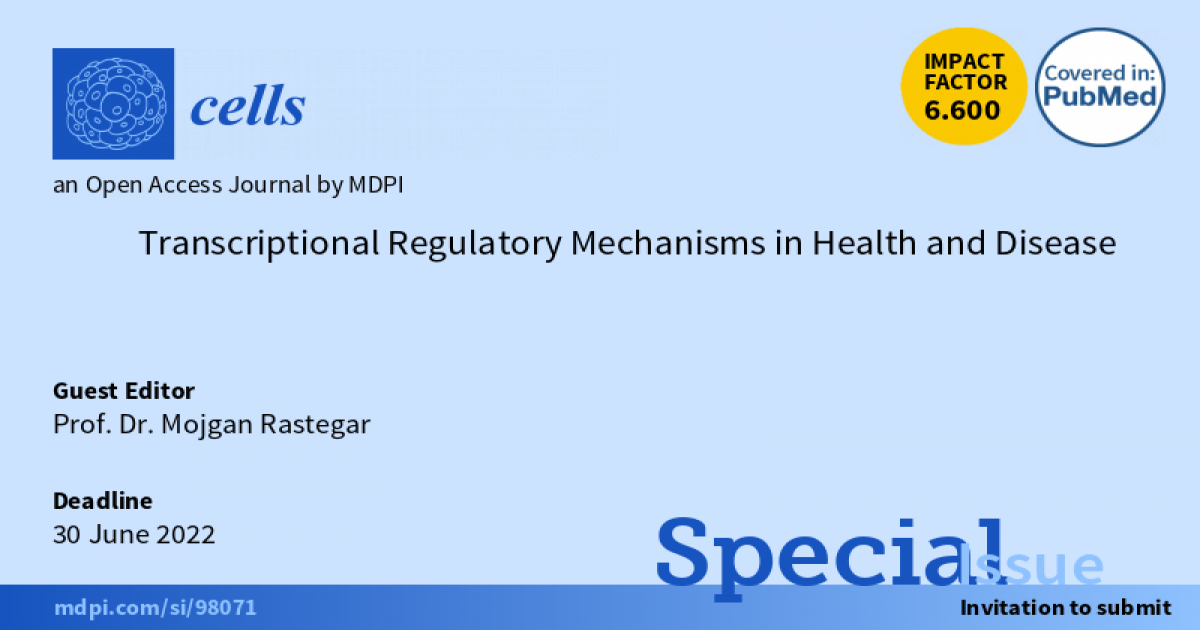Transcriptional Regulatory Mechanisms in Health and Disease
A special issue of Cells (ISSN 2073-4409). This special issue belongs to the section "Cell and Gene Therapy".
Deadline for manuscript submissions: closed (31 December 2022) | Viewed by 32316

Special Issue Editor
Interests: epigenetics; DNA methylation; transcriptional control; gene regulation; drug repurposing; neural stem cells; neurodevelopmental disorders; medulloblastoma brain tumor
Special Issues, Collections and Topics in MDPI journals
Special Issue Information
Dear Colleagues,
Gene regulatory mechanisms determine the expression state of each gene in a cell-type-specific and organ-dependent manner that are tightly controlled during development. Such regulatory mechanisms can act at the level of transcription, post-transcription, translation, and post-translation. Transcriptional regulation includes certain epigenetic mechanisms involving methylation and modification of DNA and RNA molecules, histone PTMs, action of non-coding RNAs, chromatin remodeling, nucleosome positioning, as well as interaction of trans-acting factors with cis-regulatory elements.
Transcriptional control is important for the proper process of embryonic development, organogenesis, and stem cell differentiation, with key roles in keeping our body in a health state. Accordingly, mis-regulation of transcriptional gene regulation leads to human disease.
The aim of this Special Issue is to serve as an overview platform for the latest discoveries in transcriptional gene regulation in development and disease, covering both original research and review articles. Post-transcriptional studies that involve the mechanistic basis of transcript turnover and/or transcript stability are also welcome. Studies that connect cellular function and signaling molecules to transcriptional gene regulation in development, health, and disease, as well as studies that report on the generation of novel model systems for transcriptional reporter assays are also welcome for submission.
Prof. Dr. Mojgan Rastegar
Guest Editor
Manuscript Submission Information
Manuscripts should be submitted online at www.mdpi.com by registering and logging in to this website. Once you are registered, click here to go to the submission form. Manuscripts can be submitted until the deadline. All submissions that pass pre-check are peer-reviewed. Accepted papers will be published continuously in the journal (as soon as accepted) and will be listed together on the special issue website. Research articles, review articles as well as short communications are invited. For planned papers, a title and short abstract (about 250 words) can be sent to the Editorial Office for assessment.
Submitted manuscripts should not have been published previously, nor be under consideration for publication elsewhere (except conference proceedings papers). All manuscripts are thoroughly refereed through a single-blind peer-review process. A guide for authors and other relevant information for submission of manuscripts is available on the Instructions for Authors page. Cells is an international peer-reviewed open access semimonthly journal published by MDPI.
Please visit the Instructions for Authors page before submitting a manuscript. The Article Processing Charge (APC) for publication in this open access journal is 2700 CHF (Swiss Francs). Submitted papers should be well formatted and use good English. Authors may use MDPI's English editing service prior to publication or during author revisions.
Keywords
- transcriptional regulation
- chromatin remodeling
- epigenetic modifications
- cis-regulatory elements
- trans-acting factors
- nucleosome positioning
- DNA–protein complexes
- health and disease
Benefits of Publishing in a Special Issue
- Ease of navigation: Grouping papers by topic helps scholars navigate broad scope journals more efficiently.
- Greater discoverability: Special Issues support the reach and impact of scientific research. Articles in Special Issues are more discoverable and cited more frequently.
- Expansion of research network: Special Issues facilitate connections among authors, fostering scientific collaborations.
- External promotion: Articles in Special Issues are often promoted through the journal's social media, increasing their visibility.
- Reprint: MDPI Books provides the opportunity to republish successful Special Issues in book format, both online and in print.
Further information on MDPI's Special Issue policies can be found here.






